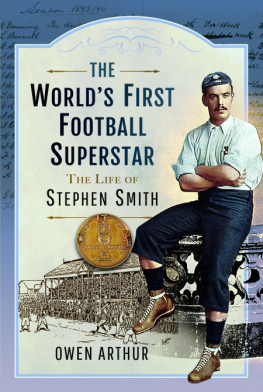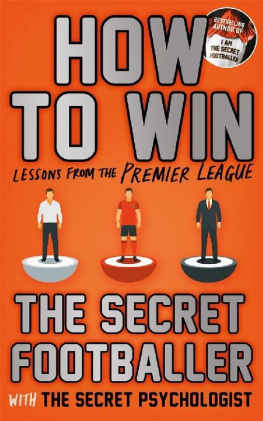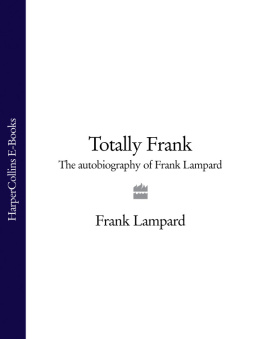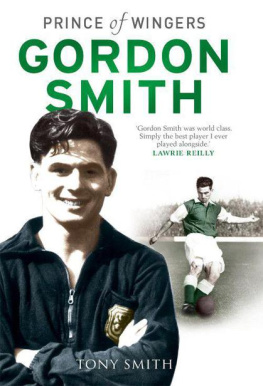Pagebreaks of the print version

The Worlds First
FOOTBALL
SUPERSTAR
The Life of Stephen Smith
All that I know most surely about morality and the obligations of men, I owe to football.
Albert Camus
For Rachel, Mum, Danny, Lilly, Ray, Rod, Glynis, Billy and Stephen Smith and for my Dad.
The Worlds First
FOOTBALL
SUPERSTAR
The Life of Stephen Smith
OWEN ARTHUR
First published in Great Britain in 2022 by
PEN AND SWORD HISTORY
An imprint of
Pen & Sword Books Ltd
Yorkshire Philadelphia
Copyright Owen Arthur, 2022
ISBN 978 1 39908 348 5
eISBN 978 1 39908 349 2
Mobi ISBN 978 1 39908 349 2
The right of Owen Arthur to be identified as Author of this work has been asserted by him in accordance with the Copyright, Designs and Patents Act 1988.
A CIP catalogue record for this book is available from the British Library.
All rights reserved. No part of this book may be reproduced or transmitted in any form or by any means, electronic or mechanical including photocopying, recording or by any information storage and retrieval system, without permission from the Publisher in writing.
Pen & Sword Books Limited incorporates the imprints of Atlas, Archaeology, Aviation, Discovery, Family History, Fiction, History, Maritime, Military, Military Classics, Politics, Select, Transport, True Crime, Air World, Frontline Publishing, Leo Cooper, Remember When, Seaforth Publishing, The Praetorian Press, Wharncliffe Local History, Wharncliffe Transport, Wharncliffe True Crime and White Owl.
For a complete list of Pen & Sword titles please contact
PEN & SWORD BOOKS LIMITED
47 Church Street, Barnsley, South Yorkshire, S70 2AS, England
E-mail:
Website: www.pen-and-sword.co.uk
Or
PEN AND SWORD BOOKS
1950 Lawrence Rd, Havertown, PA 19083, USA
E-mail:
Website: www.penandswordbooks.com
Acknowledgements
There are many people to thank for help with this book and if not mentioned here then they are acknowledged in the post-script. In 2017, John Lerwill started me on this journey by giving me a first-hand account of how Stephen Smith signed for Aston Villa at the coal mine where he worked in 1893. Since I have been fascinated about finding out more about what happened to Smith after this almost mythical sounding event.
My mothers research through her ancestry.co.uk subscription threw more flesh on the bones of the storys skeleton before lifelong Aston Villa fan Brian Halls gave me access to his website that had an abundance of photographs from Steves heyday that fuelled my research. My partner Rachel, a driving force in all aspects of research, was able to find crucial archival information about Wolverhampton Wanderers thanks to her colleague Carl Baldwin which helped greatly with evidence regarding Stephens brother Billy who played for Wolves when Steve was at Villa.
My friend and neighbour Paul Taylor and his father Robert Taylor kept me furnished with statistics from throughout the history of Aston Villa. The Pompey Historical Association, guardians of Portsmouth FCs archives, were an almost 24/7 resource thanks to the quick work of Colin Farmery, Graham Dubber and Paul Boynton to answer my queries. Many first-hand accounts of the life and times of Billy Smith were bequeathed to me thanks to Ray Stubbington via his uncle Rod Cowan the grandson-in-law of Billy. Unfortunately, Rod passed away in April 2021, having been a vital source corroborating many events detailed in the book.
Others have played key parts in the writing of this book and their contributions appear in the post-script. I hope this book does Rods memories of Billy and Steve justice as well as the efforts of all those involved in its creation. Thank you.
Introduction
Stephen Smith was born in Abbots Bromley, Staffordshire on 14 January, 1874 and died in Littlemore Hospital in the village of Benson, Oxfordshire, near to where he had retired, in May, 1935. He grew up in the village of Hazel Slade just yards from the wilds of Cannock Chase and worked underground in the mines of the Cannock and Rugeley Colliery, eventually graduating to the position of haulage machine operative, taking men and materials to and from the coal face.
Whilst working as a miner he played football for Hednesford Town after originally playing for his Colliery team. He was signed by Aston Villa Football Club Director, Fred Rinder, at the coalface, still on a shift. Steve continued to work down the mines whilst going on to gain five League Championship medals, an FA Cup medal and was part of the only the second football team in history to claim the League and Cup Double in 1897. He was denied a second FA Cup medal due to not being picked for the cup final side of 1897. With no substitutes allowed at that time, he could not play a part from the bench or claim a medal as surely he would have had modern football rules applied.
At Aston Villa he was playing for the best club in the land in the best and only fully professional league in the world. Villa could lay claim to being World Club Champions, they regularly beat Rangers and Celtic of the Scottish League, the only clubs from the only country that could lay claim to being superior in world football. Not only did Smith play for the best club in the world, in 1895 he played for England in the International Championship contested by the other British home nations. The only international team in world football at that time that could claim to match the mighty Scottish side of that period were the English.
In order to clinch the 1895 title, the English team needed to hold the traditionally stronger Scottish team to a draw to claim the title of International Champions. A Stephen Smith inspired England blew Scotland away in the first half and Smith confirmed victory with a screamer of a strike that made the score 3-0 on the stroke of half-time. Victory made England de facto World Champions that year and was the starting point for the end of Scottish hegemony at the top of the world game.
Smith left Villa for Portsmouth in 1901 due to the Football League imposing a wage cap on players. Moving for the greater earning opportunities that were available in the ambitious but fledgling Southern League meant Smith no longer needed to work his second job as a miner, as he did every summer during pre-season. He was part of Portsmouths first ever Southern League winning team during his first season with the club in 190102. Smith then left for New Brompton (who would eventually change their name to Gillingham) in 1906 and was player-manager, their first ever, in the modern sense of the word, before retiring from football in 1908. Smith made 187 appearances for Villa scoring 42 goals, 152 appearances for Pompey scoring 16 times and then playing 71 times for New Brompton scoring on 5 occasions.
He became a fishmonger on returning to Portsmouth until moving to Benson, Oxfordshire to run a local shop near there, Roke Stores. He died from a stroke on 19 May 1935, aged 61 years, and left a wife, Susan, sons Stephen and William and daughter, Irene.
The Smiths were a footballing family; his son Stephen Charles Smith carved out a career with West Ham and Charlton amongst other clubs in the 1920s. Steves brother and best friend William Billy Smith played for Wolverhampton Wanderers and against Stephen when he was at Aston Villa in the 1890s. Stephen eventually followed Billy to Pompey where they won the Southern League together in 1902. All three men were left footed, outside lefts.















